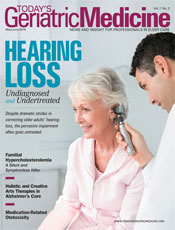
May/June 2014
Medication-Related OtotoxicityBy Mark D. Coggins, PharmD, CGP, FASCP Older adults’ hearing loss frequently is attributed to the aging process, but some medications also can cause damage that can lead to hearing loss. Because of the increased incidence of medication use among older adults, physicians should be aware of medications that may be considered ototoxic. Causes and Symptoms Symptoms of ototoxicity include tinnitus (ringing in the ears), hearing loss (bi- or unilateral), dizziness, lack of movement coordination, unsteady gait, and oscillating or bouncing vision (vertigo).2 Hearing loss may be complete or partial, depending on the severity of damage to the hair cells lining the cochlea. Tinnitus, which often is one of the first symptoms of damage, also may be described as roaring, clicking, hissing, or buzzing and may be soft or loud and high or low pitched. Additionally, fall risk can increase for patients who experience dizziness, poor coordination, unsteady gait, or vertigo.3,4 The progression of ototoxicity may be rapid or appear months following medication use. In the early stages, otoxicity may go undiagnosed if hearing loss is minimal or restricted to high-pitched sounds. As exposure to ototoxic medications increases, resulting damage can initially affect the ear’s ability to comprehend high-pitched sounds and then subsequently affect lower-pitched sounds.4 It is usually when hearing loss affects the lower speech frequencies that patients notice the changes, but often this also is the stage by which permanent damage has occurred.4 Monitoring The progression from the loss of high frequency, high-pitched sounds to low frequency, low-pitched sounds is important in evaluating hearing loss. Whereas typical hearing tests involve frequencies only as high as 6,000 to 8,000 Hz, audiologists can perform testing that evaluates hearing in very high frequencies such as 9,000 to 20,000 Hz, possibly allowing for earlier detection of ototoxic effects.5 Drug Accumulation Since most ototoxic drugs are eliminated through the kidneys, the risk of toxicity is increased by renal failure. When renal function is diminished, doses of ototoxic medications must be corrected to ensure blood levels remain therapeutic. Routine monitoring of blood levels is essential to ensure that ototoxic medications, such as the aminoglycosides, are kept below maximum therapeutic levels. Keeping these medications within suggested limits often can preserve hearing.2 Older adults are at greater risk of ototoxicity because of several factors that can contribute to drug accumulation in the body, including reduced renal and hepatic function, increased potential for polypharmacy and drug interactions, increased sensitivity to adverse drug reactions, and decreased metabolism of medications.4 Risk vs. Benefit Common Ototoxic Medications1-4,6 Aminoglycosides Patients with eardrum perforation should not be prescribed topical ototoxic agents such as neomycin otic drops because these medications could be absorbed in the inner ear, resulting in damage and hearing loss. Chemotherapeutic Agents Hearing loss usually occurs after one to two weeks of treatment, although it often can be delayed up to six months posttreatment. NSAIDs Salicylates Loop Diuretics Other Ototoxic Medications Need for Greater Ototoxicity Testing Because of the uncertainty about medications that may cause ototoxicity, it is important to advise patients to report any issues such as the emergence or worsening of tinnitus when new medications are started or doses are increased. The sidebar below provides a summary of reminders that can help to minimize the risk of ototoxicity. — Mark D. Coggins, PharmD, CGP, FASCP, is director of pharmacy services for more than 300 skilled nursing centers operated by Golden Living and a director on the board of the American Society of Consultant Pharmacists. He was recognized by the Commission for Certification in Geriatric Pharmacy with the 2010 Excellence in Geriatric Pharmacy Practice Award.
Tips to Reduce Ototoxicity Risk • Recognizing ototoxicity early on can lead to earlier identification and possibly prevent permanent damage. • Do not treat the elderly and others with preexisting hearing loss with ototoxic drugs if other effective alternatives are available. • Recognize that combination therapy of ototoxic medications increases the risk of hearing loss. • Discuss with patients the potential for ototoxicity of any drugs. • Use the lowest effective dose possible, and closely monitor blood levels of known ototoxic medications. • Remind patients to minimize their exposure to loud noises when taking ototoxic medications and to immediately report any hearing changes when new medications are added or doses change as part of their treatment regimen. • Inform patients that over-the-counter medications such as aspirin and NSAIDs can be ototoxic. • Encourage patients to report any changes in hearing immediately, especially when new medications are added or doses increased. • When possible, assess patients’ hearing before starting ototoxic medications and monitor during treatment as symptoms alone are not always reliable.
References 2. Cianfrone G, Pentangelo D, Cianfrone F, et al. Pharmacological drugs inducing ototoxicity, vestibular symptoms and tinnitus: a reasoned and updated guide. Eur Rev Med Pharmacol. 2011;15(6):601-636. 3. Ototoxicity. Vestibular Disorders Association website. http://www.vestibular.org/ototoxicity. Accessed March 23, 2014. 4. Ototoxicity. Virtual Medical Centre website. http://www.myvmc.com/diseases/ototoxicity. Last updated March 13, 2014. Accessed March 21, 2014. 5. American Speech-Language-Hearing Association Audiology Information Series. Medication effects on hearing. http://www.asha.org/uploadedFiles/aud/InfoSeriesHearingMedicationEffects.pdf. Accessed March 21, 2014. 6. League for the Hard of Hearing. Ototoxic medications: drugs that can cause hearing loss and tinnitus. http://www.ata.org/sites/ata.org/files/pdf/Ototoxic_Brochure_by_League_for_Hard_of_Hearing 7. American Academy of Audiology. American Academy of Audiology position statement and clinical practice guidelines: ototoxicity monitoring. http://www.audiology.org/resources/documentlibrary/documents/otomonpositionguideline.pdf. Published October 2009. Accessed March 21, 2014.
|
